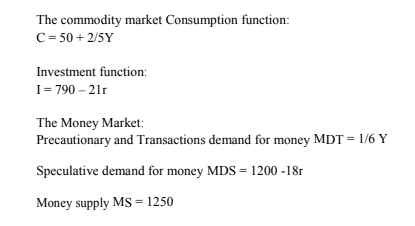December 2021. Time Allowed: 3 hours.
Answer any FIVE questions. ALL questions carry equal marks.
QUESTION ONE
1. Explain the concept of “consumer sovereignty” as applied in economic analysis. (2 marks)
Highlight five factors that limit consumer sovereignty. (5 marks)
ABC limited has been incurring losses over the last few years despite its monopolparastatal status.
Using a well-illustrated diagram, demonstrate how a monopolist can make losses in the short-run. (5 marks)
2. Discuss the four main goals of macroeconomic policy in developing countries. (8 marks)
(Total: 20 marks)
QUESTION TWO
1. Highlight the characteristics of public goods. (5 marks)
2. The following economic functions have been derived from the Kenya Coffee Millers Limited:

Required:
Which of the two functions represents a demand curve and supply curve. Cite relevant economic reasons. (4 marks)
Determine the equilibrium price and quantity in the market (6 marks)
Explain, with the aid of a diagram, the effect on the demand and supply functions indicated in (a)above of a simultaneous decrease in cost of inputs and a decrease in the price of a substitute good. (5 marks)
(Total: 20 marks)
QUESTION THREE
1. Explain the term ‘Price control’. (4 marks)
2. Explain the circumstances under which price control is considered necessary. (5 marks)
The utility total function and other relevant variables related to a consumer are given as follows:

Required:
Determine the equilibrium quantities of commodities x and z using the cardinalist approach to consumer behavior. (6 marks)
Outline the axioms of the cadinalist approach to consumer behavior. (5 marks)
(Total: 20 marks)
QUESTION FOUR
1. Explain the importance of elasticity of supply in decision making. (6 marks)
2. Examine five factors that limit the effectiveness of the monetary policies in developing countries. (5 marks)
3. You are given the following information about the commodity and Money markets of a closed economy without government intervention:

Required:
Determine the equilibrium levels of income and interest rate for this economy. (6 marks)
Using a well labeled diagram, illustrate the equilibrium condition in part (i) above. (3 marks)
(Total: 20 marks)
QUESTION FIVE
1. Explain the meaning of mobility of factors of production and highlight the significance of factor mobility. (6 marks)
2. Outline the economic policy recommendations that would reduce regional development imbalances developing countries. (6 marks)
The table below represents economic transactions for country XYZ in billions of shillings:
Total output Intermediate purchases
Agriculture 130 110
Manufacturing 170 145
Services 155 125
Required:
Calculate the Gross National Product of this economy using the value added approach. (4 marks)
If depreciation and indirect taxes equal 8 billion and 7 billion shillings respectively, find theNet Domestic Product both at Market prices and at factor cost. (4 marks)
(Total: 20 marks)
QUESTION SIX
1. Explain the term ‘Oligopoly’? (2 marks)
2. Analyse the challenges facing the formation of “cartels” in the oligopoly market structure. (8 marks)
3. Citing reasons, suggest why rising inflation is a major cause of concern in developing countries. (10 marks)
(Total: 20 marks)
QUESTION SEVEN
1. Outline the main causes for the rise in the unemployment levels in developing countries. (5 marks)
2. Suggest the possible r e m e d y measures to contain unemployment crisis in developing countries. (7 marks)
3. Explain the likely challenges facing currency demonetization in your country. (8 marks)
(Total: 20 marks)
